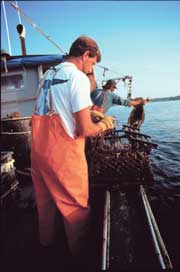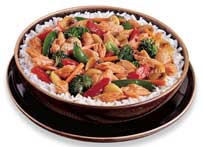
If there is time on hand, you can drive to Anchorage from anywhere on the continent. It is about 4,650 miles from New York and roughly 2,440 miles from Seattle, Wash.
Since Alaska was purchased in 1867 from Russia, gold, oil and natural gas have been the financial backbone for the state. Now, it appears the fishing industry is doing some catching up.
Alaska's fishing industry leads the state in providing 47% of private sector jobs, and is second only to the oil industry in providing revenue to the state. With over 33,000 miles of coast (more than the lower 48 states combined), the state's cold, pristine waters are the perfect home for sea life. Because of the high quality and great flavor of the seafood, consumer demand is always great and yields premium prices.
The coastal waters produce some of the best seafood in the world. A King crab's average weight can easily reach 10 pounds and measure four feet from tip to tip. The King salmon is Alaska's official fish, with Sockeye (red) and Coho (silver) salmon a distant second and third. The commercially caught Halibut can weigh between 150 to 200 pounds, and demand for it is rising, due to increased sales in grocery stores, fish/seafood counters and restaurants across the country.
According to the Alaska Department of Fish and Game, nearly 95% of all commercially caught salmon in the U.S. is harvested in Alaska (farm fishing is prohibited in the state). Annually, the average number of commercially caught salmon runs between 150 to 200 million. The state's fisheries are comprised of hundreds of small businesses that use ocean friendly methods to preserve seafood for future generations.
These sound practices are very important to politically correct grocery store chains such as Whole Foods Market, Austin, Texas, a company that prides itself in demonstrating a long-term commitment to seafood preservation by supporting fishing practices that ensure the ecological health of the ocean.
Whole Foods Market is probably the only grocery store chain that has a website with an online legislative action center, designed to easily put customers in contact with government officials and the media regarding important political issues. Wild Alaska salmon is one of the hot topics carefully watched to guarantee a healthy fishing environment for many years to come.
Mainstream Foods, Local Ingredients
It is not uncommon to go to a local restaurant in Anchorage and start the day off with a typical Alaskan breakfast containing smoked salmon hash along with reindeer sausage, eggs, and wild blueberry muffins.There is a roadside deli chain called the Salmon Express, a subsidiary of Lady Marion Seafood Inc., Anchorage, that is franchised across the state. The units sell Alaskan Smoked Quesadillas almost exclusively, and focus on quick service and the highest quality ingredients.
The Santa's Smokehouse, part of Interior Alaska Fish Processors Inc., Fairbanks, Alaska, is a retail store and mail order business. All kinds of fish products are sold on the premises or shipped across the country. Popular items include Smoked Chum Salmon Strips with the flavors of Black Pepper, Cajun, Sweet & Sour, Teriyaki and Honey Cured. The company also offers smoked salmon hotdogs and canned Cajun salmon sausage.
Most of the wild salmon offered by Santa's Smokehouse is fished out of the Yukon River, proclaimed a national monument in 1978. The Yukon River was named after the American Indians and Eskimos. The river King salmon is claimed to have the highest omega-3 fatty acid content of any salmon in the world. Omega-3s have been found to have a role in the prevention and management of cardiovascular disease.

Alaskan Birch Syrup
Another item for which Alaska is well-known is birch syrup, produced by collecting sap from birch trees (trees used to make paper), and then evaporating it into syrup. It takes about 100 gallons of sap to make one gallon of birch syrup, while it takes roughly 40 gallons of sap to make one gallon of maple syrup. The birch sap contains about 1 to 1.5% sugar, which looks and tastes like water right out of the tree. It is concentrated to 67% by evaporation, giving the syrup its color and flavor. The predominant, naturally occurring sugar is fructose, as opposed sucrose in maple syrup. Birch syrup is high in vitamin C, potassium, manganese, thiamin and calcium.Birch syrup also is used as a versatile sweetener that blends well with other flavored products, including natural sodas, ice cream and baked goods.
Boylan's Bottleworks, Haledon, N.J., manufactures a beverage called Creamy Red Birch, sold through large grocery and convenient stores across the country. Birch oil is used in the beverage for flavor. The Coca-Cola Company, Atlanta, also offers a birch beverage, Fanta's Birch Beer Beverage, distributed and sold throughout the country and overseas.
A Taste for Wild Game
One of Alaska's award-winning restaurants, The Pump House in Fairbanks, has raised the culinary bar up a little higher. There is a selection of specialty wild game on its upscale menu. Reindeer (Caribou) Stew made with tomatoes, onions, potatoes, celery and local fresh herbs and spices is popular. Wild Musk Ox Ground Sirloin also can be found on the menu, served with wild mushroom gravy, red cabbage and Yukon gold mashed potatoes.
Like most culinary trends, once these dishes have taken off successfully, they will be copied by other restaurateurs and become mainstream items. Eventually, they will become a canned or frozen dish, processed and distributed by retail and foodservice manufacturers.
Website Resources
www.santassmokehouse.com— Santas Smokehousewww.alaskan.com/seafood— Lady Marion Seafood Inc.
www.wholefoods.com— Whole Foods Market
www.alaskabirchsyrup.com— Kahiltna Birchworks' Alaska Birch Syrup Products
www.pumphouse.com— Pump House Restaurant